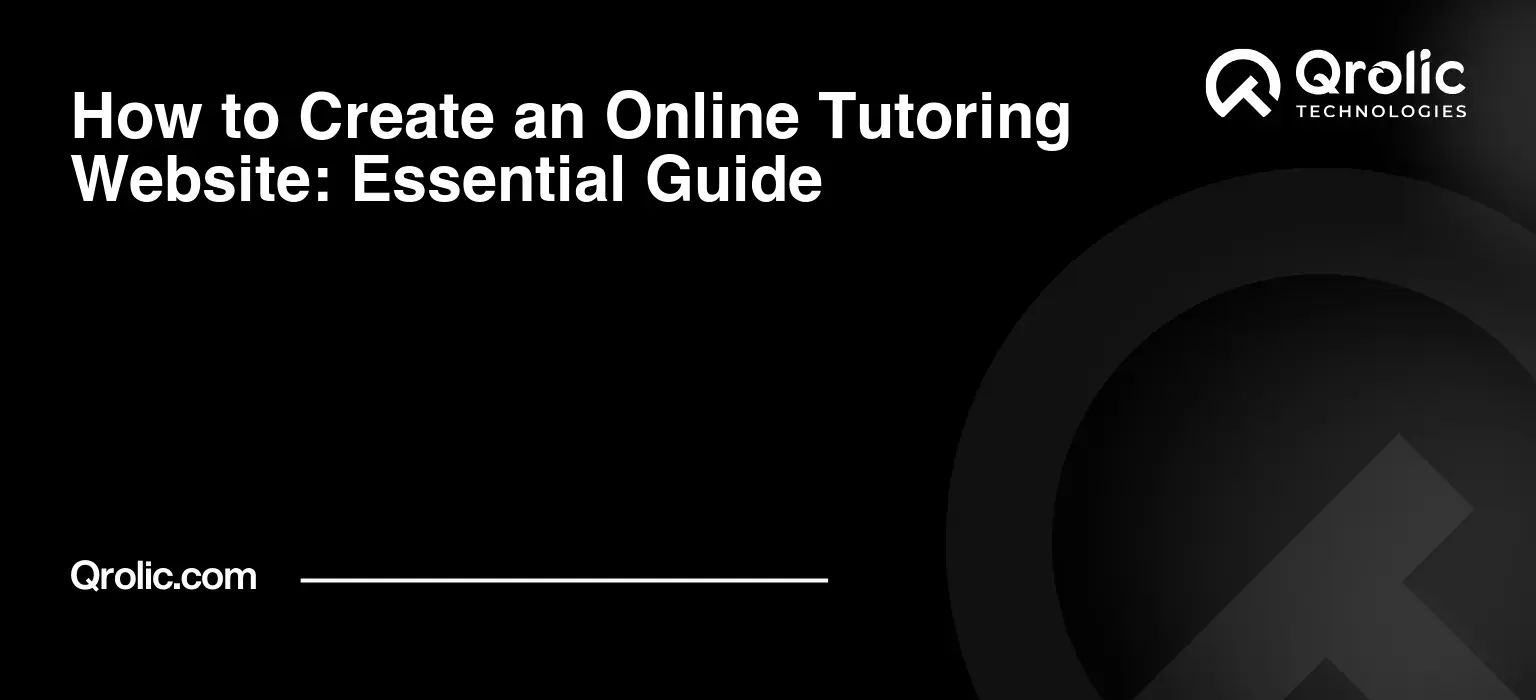Quick Summary:
- Your website is key for attracting students and sales.
- Careful planning and the right LMS are essential.
- Include engaging features and optimize for search.
Table of Contents
- The Foundation of Your Digital Classroom: Why a Strong Website Matters for Online Course Success
- First Impressions That Last: Attracting Your Ideal Student
- Beyond the Basics: Engaging Students and Fostering a Learning Community
- The Revenue Generator: Converting Visitors into Paying Students
- Planning Your Educational Empire: Essential Steps Before Development
- 1. Define Your Niche and Target Audience: Who Are You Trying to Reach?
- 2. Define Your Courses and Curriculum: What Knowledge Will You Impart?
- 3. Choose the Right Learning Management System (LMS): Your Virtual Classroom
- 4. Website Design and Functionality: Crafting the User Experience
- 5. Budget and Timeline: Managing Resources Effectively
- Building Your Virtual Campus: Key Features of a Successful Education Platform Website
- 1. User Registration and Management: Streamlining the Enrollment Process
- 2. Course Catalog and Search: Helping Students Discover the Right Courses
- 3. Course Content Delivery: Engaging and Interactive Learning Experiences
- 4. Communication and Collaboration: Fostering a Learning Community
- 5. E-commerce and Payment Processing: Monetizing Your Courses
- Choosing the Right Tools: Technologies Powering Your Education Platform
- 1. Content Management System (CMS): The Foundation of Your Website
- 2. Learning Management System (LMS): Delivering the Educational Experience
- 3. Video Hosting and Streaming: Delivering High-Quality Video Content
- 4. E-commerce and Payment Processing: Monetizing Your Courses
- 5. Marketing and Analytics Tools: Promoting and Measuring Your Success
- SEO for Online Courses: Getting Found by Your Future Students
- 1. Keyword Research: Understanding What Your Audience is Searching For
- 2. On-Page Optimization: Making Your Website Search Engine Friendly
- 3. Content Marketing: Creating Valuable Content for Your Audience
- 4. Link Building: Earning Authority and Trust
- 5. Technical SEO: Ensuring a Smooth User Experience
- Qrolic Technologies: Your Partner in Building a Powerful Education Platform
- Why Choose Qrolic Technologies?
- Our Services for Online Course Providers
- Let’s Build Your Educational Dream Together
The Foundation of Your Digital Classroom: Why a Strong Website Matters for Online Course Success
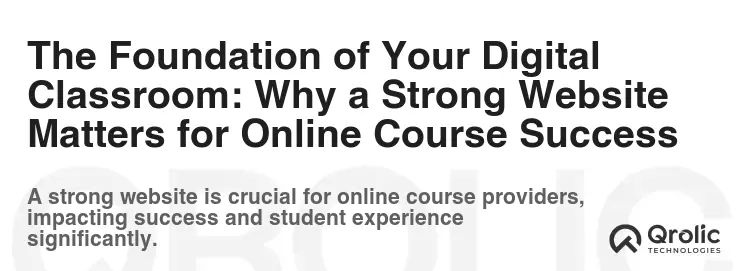
Imagine a bustling university campus, but instead of brick and mortar, it’s a pixel-perfect reflection online. That’s what your website is for your online courses: the central hub, the welcoming doorway, and the academic heart of your educational venture. But why is a strong website so crucial for attracting students, fostering engagement, and ultimately, generating revenue?
First Impressions That Last: Attracting Your Ideal Student
Think about it – your website is often the first interaction a potential student has with your brand. It’s your digital handshake. A poorly designed, confusing, or outdated website screams unprofessionalism and can instantly turn away potential students. Conversely, a well-crafted website exudes credibility, competence, and care. It tells prospective learners that you’re invested in providing a high-quality educational experience.
-
Trust and Credibility: A professional website builds trust. It shows you’re serious about your online courses and dedicated to providing a valuable learning experience. Think clear testimonials, secure payment gateways, and easily accessible contact information.
-
Brand Authority: Your website is the foundation of your brand. Consistent branding across your website, social media, and marketing materials creates a cohesive and recognizable identity. This helps you stand out from the competition in the increasingly crowded online learning space.
-
Clear Course Information: Potential students need to quickly and easily understand what your courses offer. Clear course descriptions, learning outcomes, instructor bios, and pricing information are essential. Think of it as giving them the syllabus upfront.
Beyond the Basics: Engaging Students and Fostering a Learning Community
A successful website does more than just display information. It fosters engagement and creates a sense of community. This is especially important in online learning, where students may feel isolated.
-
Interactive Learning Elements: Integrate quizzes, forums, and interactive exercises directly into your website to keep students engaged. Consider gamification elements like badges and leaderboards to motivate learners.
-
Community Forums and Discussion Boards: Create a space for students to connect with each other, ask questions, and share their experiences. This fosters a sense of community and provides valuable peer support.
-
Live Chat and Support: Offer real-time support to answer student questions and address any technical issues. Prompt and helpful support demonstrates your commitment to student success.
-
Easy Navigation and User-Friendly Design: A website that is easy to navigate and visually appealing encourages students to explore your courses and spend more time on your platform. Think about the user experience (UX) and ensure a seamless journey for your learners.
The Revenue Generator: Converting Visitors into Paying Students
Ultimately, your website is a critical marketing tool. It should be designed to convert website visitors into paying students. This requires a clear understanding of your target audience and a well-optimized sales funnel.
-
Clear Call-to-Actions (CTAs): Guide visitors towards desired actions with prominent CTAs, such as “Enroll Now,” “Learn More,” or “Download a Free Guide.” Make it easy for them to take the next step.
-
Lead Capture Forms: Collect email addresses to nurture leads and build your email list. Offer valuable free resources, such as e-books or webinars, in exchange for contact information.
-
Mobile Optimization: Ensure your website is fully responsive and looks great on all devices. A significant portion of your traffic will likely come from mobile users.
-
SEO Optimization: Optimize your website for search engines so that potential students can easily find you online. This involves using relevant keywords, creating high-quality content, and building backlinks. This all ties into online course website development.
In conclusion, a strong website is not just a nice-to-have for online course providers; it’s a must-have. It’s the foundation of your digital classroom, the key to attracting and engaging students, and the engine that drives your revenue growth. Investing in e-learning web design is investing in the future of your business.
Planning Your Educational Empire: Essential Steps Before Development
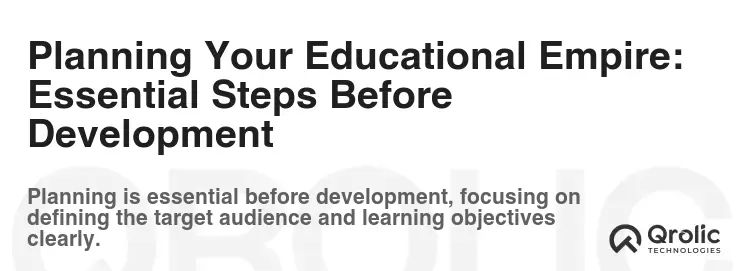
Before diving into the technical aspects of online course website development, it’s crucial to lay a solid foundation by carefully planning your approach. This planning phase is not just about aesthetics; it’s about defining your goals, understanding your audience, and crafting a strategy for success. Treat it like the blueprint for your educational empire.
1. Define Your Niche and Target Audience: Who Are You Trying to Reach?
Before you even think about design or functionality, you need to understand who you’re trying to reach. Are you targeting high school students preparing for college, professionals looking to upskill, or hobbyists eager to learn a new craft?
-
Identify Your Ideal Student Profile: Create a detailed profile of your ideal student, including their age, demographics, interests, pain points, and learning goals.
-
Niche Down: Don’t try to be everything to everyone. Focus on a specific niche where you can establish yourself as an expert. This will make it easier to attract your target audience and stand out from the competition.
-
Market Research: Conduct market research to understand the demand for your courses and the competition in your niche. This will help you identify opportunities and avoid oversaturated areas.
2. Define Your Courses and Curriculum: What Knowledge Will You Impart?
Clearly define the courses you plan to offer, the curriculum you’ll cover, and the learning outcomes you expect students to achieve.
-
Course Outline: Develop a detailed outline for each course, including the modules, lessons, and activities.
-
Learning Objectives: Clearly state the learning objectives for each module and lesson. What specific skills or knowledge will students acquire?
-
Assessments and Assignments: Design assessments and assignments that will help students demonstrate their understanding of the material.
-
Course Materials: Gather or create all the necessary course materials, such as videos, readings, quizzes, and downloadable resources.
3. Choose the Right Learning Management System (LMS): Your Virtual Classroom
An LMS is the software that will power your online courses. It provides the infrastructure for delivering course content, managing student enrollment, tracking progress, and facilitating communication. Choosing the right LMS is a critical decision.
-
Consider Your Needs: What features do you need in an LMS? Do you need support for video streaming, quizzes, forums, or e-commerce?
-
Research Popular Options: Explore popular LMS platforms like Moodle, Teachable, Thinkific, LearnDash (for wordpress), and Kajabi.
-
Consider Scalability: Choose an LMS that can grow with your business. Can it handle a large number of students and courses?
-
Integrate with Your Website: Ensure the LMS can seamlessly integrate with your website.
4. Website Design and Functionality: Crafting the User Experience
Now you can start thinking about the design and functionality of your website. This is where you’ll focus on creating a user-friendly and engaging experience for your students. This stage is pivotal in successful e-learning web design.
-
User-Friendly Navigation: Design a website that is easy to navigate. Students should be able to find the information they need quickly and easily.
-
Visually Appealing Design: Create a visually appealing design that reflects your brand and attracts your target audience.
-
Mobile Responsiveness: Ensure your website is fully responsive and looks great on all devices.
-
SEO Optimization: Optimize your website for search engines so that potential students can easily find you online.
-
Payment Gateway Integration: Integrate a secure payment gateway so that students can easily enroll in your courses.
5. Budget and Timeline: Managing Resources Effectively
Establish a realistic budget and timeline for your website development project. This will help you stay on track and avoid overspending.
-
Cost Estimates: Get cost estimates from different web developers or agencies.
-
Timeline: Create a detailed timeline for each phase of the project, from planning to launch.
-
Contingency Plan: Build in a contingency plan for unexpected delays or expenses.
By taking the time to carefully plan your education platform website, you’ll set yourself up for success. This planning phase is an investment that will pay off in the long run.
Building Your Virtual Campus: Key Features of a Successful Education Platform Website
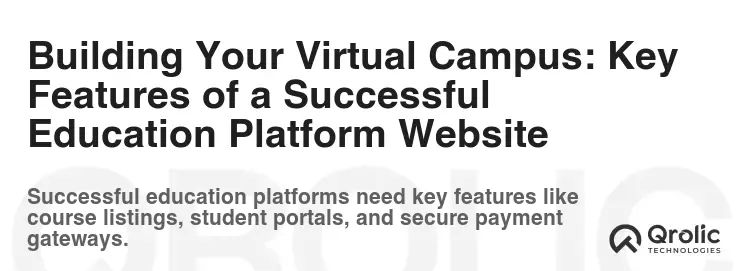
Now that you have a solid plan in place, it’s time to focus on the key features that will make your education platform website stand out from the crowd. Think of these features as the classrooms, libraries, and common areas of your virtual campus.
1. User Registration and Management: Streamlining the Enrollment Process
A seamless user registration and management system is crucial for attracting and retaining students.
-
Easy Registration Process: Make it easy for students to register for your courses. Offer multiple registration options, such as email, social media, or Google account.
-
User Profiles: Allow students to create detailed profiles that include their interests, learning goals, and progress.
-
Role-Based Access Control: Implement role-based access control to restrict access to certain features or content based on user roles (e.g., student, instructor, administrator).
-
Password Management: Provide a secure and user-friendly password management system.
2. Course Catalog and Search: Helping Students Discover the Right Courses
A well-organized course catalog and robust search functionality are essential for helping students find the courses that are right for them.
-
Clear Course Categories: Organize your courses into clear and logical categories.
-
Detailed Course Descriptions: Provide detailed course descriptions that include learning outcomes, instructor bios, and pricing information.
-
Advanced Search Filters: Implement advanced search filters that allow students to search by keywords, categories, price, and other criteria.
-
Course Previews: Offer course previews or free trial lessons to give potential students a taste of your courses.
3. Course Content Delivery: Engaging and Interactive Learning Experiences
The way you deliver your course content will have a significant impact on student engagement and learning outcomes.
-
Video Streaming: Integrate a reliable video streaming platform to deliver high-quality video lectures.
-
Downloadable Resources: Provide downloadable resources, such as PDFs, templates, and worksheets, to supplement the video lectures.
-
Interactive Quizzes and Assessments: Incorporate interactive quizzes and assessments to test student understanding.
-
Gamification Elements: Use gamification elements, such as badges, points, and leaderboards, to motivate students and make learning more fun.
4. Communication and Collaboration: Fostering a Learning Community
Creating a sense of community is essential for online learning.
-
Discussion Forums: Implement discussion forums where students can ask questions, share their experiences, and connect with each other.
-
Live Chat: Offer live chat support to answer student questions and address any technical issues.
-
Email Integration: Integrate with an email marketing platform to send course announcements, reminders, and updates.
-
Instructor Feedback: Provide opportunities for instructors to provide personalized feedback to students.
5. E-commerce and Payment Processing: Monetizing Your Courses
A seamless e-commerce and payment processing system is crucial for monetizing your courses.
-
Secure Payment Gateway: Integrate a secure payment gateway, such as Stripe or PayPal, to process online payments.
-
Subscription Options: Offer subscription options to provide students with access to a library of courses.
-
Discount Codes and Promotions: Create discount codes and promotions to attract new students.
-
Reporting and Analytics: Track your sales, revenue, and student enrollment to measure the success of your courses.
By incorporating these key features into your online course website development, you can create a powerful and engaging education platform website that will attract students, foster a thriving learning community, and generate revenue.
Choosing the Right Tools: Technologies Powering Your Education Platform
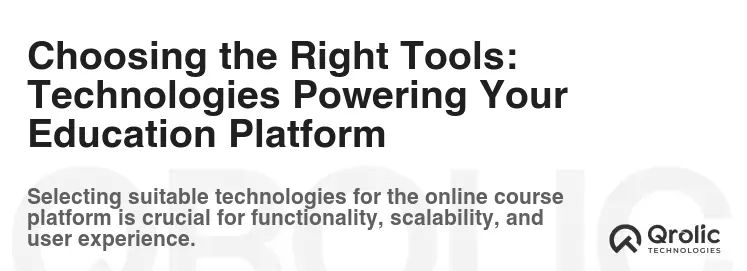
The technology stack you choose for your education platform website will significantly impact its performance, scalability, and security. Selecting the right tools requires careful consideration of your needs, budget, and technical expertise.
1. Content Management System (CMS): The Foundation of Your Website
A CMS is the software that allows you to create, manage, and publish content on your website. While some platforms offer built-in CMS functionality, others require integration with a separate CMS.
-
WordPress: The most popular CMS in the world, WordPress is a versatile and powerful platform that can be used to build any type of website, including education platform websites. It offers a wide range of themes and plugins that can be used to customize your website. It’s a strong contender for e-learning web design.
-
Drupal: A more advanced CMS, Drupal is a good choice for complex websites with demanding security and performance requirements.
-
Joomla: Another popular CMS, Joomla offers a good balance of power and ease of use.
2. Learning Management System (LMS): Delivering the Educational Experience
As discussed earlier, the LMS is the heart of your education platform website.
Cloud-Based LMS:
- Teachable: A popular cloud-based LMS that offers a user-friendly interface and a wide range of features.
- Thinkific: Another popular cloud-based LMS that is known for its flexibility and customization options.
- Kajabi: An all-in-one platform that combines LMS functionality with marketing tools and website hosting.
Self-Hosted LMS:
- Moodle: A popular open-source LMS that is highly customizable and scalable.
- LearnDash (WordPress Plugin): A powerful LMS plugin for WordPress that allows you to create and sell courses directly from your WordPress website. This is a flexible choice for online course website development.
3. Video Hosting and Streaming: Delivering High-Quality Video Content
Video is an essential component of many online courses. You’ll need a reliable video hosting and streaming platform to deliver high-quality video content to your students.
-
Vimeo: A popular video hosting platform that offers excellent video quality and a range of features for educators.
-
YouTube: The world’s largest video sharing platform, YouTube is a free option for hosting videos. However, it is not specifically designed for educational purposes.
-
Wistia: A video hosting platform specifically designed for businesses. It offers advanced analytics and marketing tools.
4. E-commerce and Payment Processing: Monetizing Your Courses
You’ll need to integrate with an e-commerce platform and a payment gateway to sell your courses online.
-
Stripe: A popular payment gateway that offers a secure and reliable way to process online payments.
-
PayPal: Another popular payment gateway that is widely used around the world.
-
WooCommerce (WordPress Plugin): A popular e-commerce plugin for WordPress that allows you to sell courses directly from your WordPress website.
5. Marketing and Analytics Tools: Promoting and Measuring Your Success
You’ll need marketing and analytics tools to promote your courses and track your results.
-
Google Analytics: A free tool that allows you to track website traffic, user behavior, and conversions.
-
Google Search Console: A free tool that allows you to monitor your website’s performance in Google search results.
-
Email Marketing Platform (e.g., Mailchimp, ConvertKit): An email marketing platform allows you to build your email list, send newsletters, and automate your email marketing campaigns.
-
Social Media Management Tools (e.g., Buffer, Hootsuite): Social media management tools allow you to schedule posts, track engagement, and manage your social media presence.
Choosing the right tools for your education platform website is a crucial decision that will impact its performance, scalability, and security. Carefully consider your needs, budget, and technical expertise before making a decision.
SEO for Online Courses: Getting Found by Your Future Students
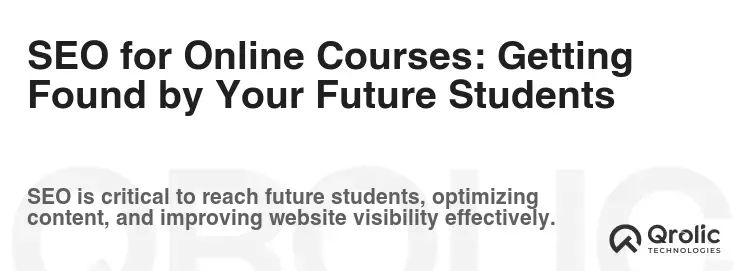
Having a beautiful and functional education platform website is only half the battle. You also need to ensure that potential students can find your courses online. This is where Search Engine Optimization (SEO) comes in. Effective SEO is critical for attracting organic traffic and growing your online course business.
1. Keyword Research: Understanding What Your Audience is Searching For
Keyword research is the foundation of any successful SEO strategy. It involves identifying the keywords and phrases that your target audience is using to search for online courses.
-
Brainstorming: Start by brainstorming a list of keywords related to your courses. Think about the topics you cover, the skills students will learn, and the problems your courses solve.
-
Keyword Research Tools: Use keyword research tools like Google Keyword Planner, SEMrush, Ahrefs, and Moz Keyword Explorer to identify high-volume, low-competition keywords.
-
Long-Tail Keywords: Focus on long-tail keywords, which are longer and more specific phrases that target a more niche audience. For example, instead of “online marketing course,” you might target “online marketing course for small business owners.”
-
Competitor Analysis: Analyze your competitors’ websites to see what keywords they are targeting.
2. On-Page Optimization: Making Your Website Search Engine Friendly
On-page optimization involves optimizing the content and structure of your website to make it more search engine friendly.
-
Title Tags: Optimize your title tags with relevant keywords. The title tag is the first thing that search engines see, so it’s important to make it count.
-
Meta Descriptions: Write compelling meta descriptions that entice users to click on your website in search results.
-
Header Tags (H1-H6): Use header tags to structure your content and make it easier to read for both users and search engines.
-
Image Alt Text: Add alt text to your images to describe what the images are about. This helps search engines understand the content of your images.
-
Internal Linking: Link to other relevant pages on your website to improve your website’s structure and navigation.
-
URL Structure: Use descriptive and keyword-rich URLs.
3. Content Marketing: Creating Valuable Content for Your Audience
Content marketing involves creating and sharing valuable, informative, and engaging content to attract and retain your target audience.
-
Blog Posts: Write blog posts on topics related to your courses. This will help you attract organic traffic and establish yourself as an expert in your field.
-
E-books and White Papers: Create e-books and white papers that provide in-depth information on specific topics.
-
Infographics: Create visually appealing infographics that present data and information in an easy-to-understand format.
-
Videos: Create videos that showcase your courses and provide valuable tips and insights.
4. Link Building: Earning Authority and Trust
Link building involves getting other websites to link to your website. This is a crucial factor in improving your website’s search engine rankings.
-
Guest Blogging: Write guest posts for other websites in your niche and include a link back to your website.
-
Broken Link Building: Find broken links on other websites and offer to replace them with a link to your website.
-
Resource Link Building: Create valuable resources, such as guides or tools, and promote them to other websites.
-
Directory Submissions: Submit your website to relevant online directories.
5. Technical SEO: Ensuring a Smooth User Experience
Technical SEO involves optimizing the technical aspects of your website to make it easier for search engines to crawl and index your site.
-
Website Speed: Optimize your website’s loading speed. A slow website can hurt your search engine rankings and user experience.
-
Mobile Friendliness: Ensure your website is mobile friendly. Google uses mobile-first indexing, which means that it primarily uses the mobile version of your website to rank your site.
-
Site Structure: Create a clear and logical site structure.
-
XML Sitemap: Submit an XML sitemap to Google Search Console.
-
Robots.txt File: Create a robots.txt file to tell search engines which pages on your website to crawl and index.
By implementing these SEO strategies, you can significantly improve your website’s search engine rankings and attract more potential students to your online course website.
Qrolic Technologies: Your Partner in Building a Powerful Education Platform

Qrolic Technologies (https://qrolic.com/) is a leading web development company specializing in creating custom education platform websites that meet the unique needs of online course providers. We understand the challenges and opportunities in the e-learning industry, and we’re passionate about helping our clients build successful online education businesses.
Why Choose Qrolic Technologies?
-
Expertise in E-Learning Web Design: We have a team of experienced web developers and designers who specialize in e-learning web design. We understand the specific requirements of online course providers and can create websites that are engaging, user-friendly, and effective.
-
Custom Solutions: We don’t believe in one-size-fits-all solutions. We work closely with our clients to understand their specific needs and create custom websites that meet their unique requirements.
-
Comprehensive Services: We offer a full range of Web Development services, including website design, development, hosting, maintenance, and SEO.
-
Focus on User Experience: We prioritize user experience in all of our web development projects. We create websites that are easy to navigate, visually appealing, and optimized for mobile devices.
-
Scalable Solutions: We build websites that are scalable and can grow with your business. Whether you’re just starting out or you’re an established online course provider, we can create a website that meets your needs.
-
Affordable Pricing: We offer competitive pricing without compromising on quality.
Our Services for Online Course Providers
-
Website Design and Development: We create custom websites that are visually appealing, user-friendly, and optimized for search engines.
-
LMS Integration: We seamlessly integrate your website with your chosen LMS platform, ensuring a smooth and efficient learning experience for your students.
-
E-commerce Integration: We integrate secure payment gateways so that you can easily sell your courses online.
-
Mobile Optimization: We ensure that your website is fully responsive and looks great on all devices.
-
SEO Services: We offer a range of SEO services to help you attract more potential students to your website.
-
Website Maintenance and Support: We provide ongoing website maintenance and support to ensure that your website is always up-to-date and running smoothly.
Let’s Build Your Educational Dream Together
If you’re looking for a reliable and experienced partner to help you build a powerful education platform website, contact Qrolic Technologies today. We’d be happy to discuss your project and provide you with a free quote. Let us help you turn your educational dream into a reality.



